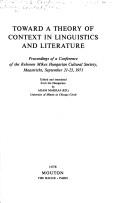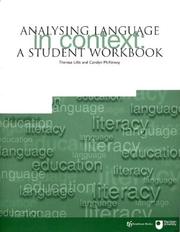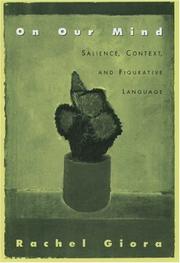| Listing 1 - 10 of 93 | << page >> |
Sort by
|

ISBN: 3110819139 9027932735 Publisher: De Gruyter Mouton
Abstract | Keywords | Export | Availability | Bookmark
 Loading...
Loading...Choose an application
- Reference Manager
- EndNote
- RefWorks (Direct export to RefWorks)
Book
Year: 1992 Publisher: London New York Routledge
Abstract | Keywords | Export | Availability | Bookmark
 Loading...
Loading...Choose an application
- Reference Manager
- EndNote
- RefWorks (Direct export to RefWorks)
Book
ISBN: 1000060438 0429274580 1000027333 Year: 2020 Publisher: Abingdon, Oxon ; New York : Routledge,
Abstract | Keywords | Export | Availability | Bookmark
 Loading...
Loading...Choose an application
- Reference Manager
- EndNote
- RefWorks (Direct export to RefWorks)
"This book is a guide to understanding and applying the essential, heretofore elusive notion of context in language study and pedagogy: Éva Illés offers a new, critical, systematic theoretical framework, then applies that framework to practical interactions and issues in communicative language teaching rooted in English as a Lingua Franca. By linking theory and practice for research and teaching around the world, this book brings a new awareness of how context can be conceptualized and related to language pedagogy to advanced students, teachers, teacher educators, and researchers of language teaching, applied linguistics, and pragmatics"--
Book
ISBN: 9781108989275 1108989276 1108996477 1108996841 9781108839136 9781108984461 1108839134 9781108996471 9781108996846 Year: 2024 Publisher: Cambridge, England : Cambridge University Press,
Abstract | Keywords | Export | Availability | Bookmark
 Loading...
Loading...Choose an application
- Reference Manager
- EndNote
- RefWorks (Direct export to RefWorks)
For more than a decade, linguistics has moved increasingly away from evaluating language as an autonomous phenomenon, towards analysing it 'in use', and showing how its function within its social and interactional context plays an important role in shaping in its form. Bringing together state-of-the-art research from some of the most influential scholars in linguistics today, this Handbook presents an extensive picture of the study of language as it used 'in context' across a number of key linguistic subfields and frameworks. Organised into five thematic parts, the volume covers a range of theoretical perspectives, with each chapter surveying the latest work from areas as diverse as syntax, pragmatics, psycholinguistics, applied linguistics, conversational analysis, multimodality, and computer-mediated communication. Comprehensive, yet wide-ranging, the Handbook presents a full description of how the theory of context has revolutionised linguistics, and how its renewed study is crucial in an ever-changing world.
Context (Linguistics) --- Context (Linguistics). --- Contexte.
Book
ISBN: 9781623563059 1623563054 1474269788 1474295347 1623563011 162356235X Year: 2014 Volume: 3 Publisher: London, UK: Bloomsbury academic,
Abstract | Keywords | Export | Availability | Bookmark
 Loading...
Loading...Choose an application
- Reference Manager
- EndNote
- RefWorks (Direct export to RefWorks)
Context (Linguistics). --- Discourse analysis. --- Context (Linguistics) --- Discourse analysis

ISBN: 9781858562872 1858562872 Year: 2003 Publisher: Stoke-on-Trent: Trentham Books,
Abstract | Keywords | Export | Availability | Bookmark
 Loading...
Loading...Choose an application
- Reference Manager
- EndNote
- RefWorks (Direct export to RefWorks)
Book
ISBN: 9783034301282 Year: 2010 Publisher: Bern : New York : Peter Lang,
Abstract | Keywords | Export | Availability | Bookmark
 Loading...
Loading...Choose an application
- Reference Manager
- EndNote
- RefWorks (Direct export to RefWorks)
Book
ISBN: 9781138818392 9781315745275 9781317594673 1138818399 Year: 2017 Publisher: New York (N.Y.): Routledge,
Abstract | Keywords | Export | Availability | Bookmark
 Loading...
Loading...Choose an application
- Reference Manager
- EndNote
- RefWorks (Direct export to RefWorks)
Epistemic contextualism is a recent and hotly debated topic in philosophy. Contextualists argue that the language we use to attribute knowledge can only be properly understood relative to a specified context. How much can our knowledge depend on context? Is there a limit, and if so, where does it lie? What is the relationship between epistemic contextualism and fundamental topics in philosophy such as objectivity, truth, and relativism? The Routledge Handbook of Epistemic Contextualism is an outstanding reference source to the key topics, problems, and debates in this exciting subject and is the first collection of its kind. Comprising thirty-seven chapters by a team of international contributors the Handbook is divided into eight parts: Data and motivations for contextualism, Methodological issues, Epistemological implications, Doing without contextualism, Relativism and disagreement, Semantic implementations, Contextualism outside ‘knows’, Foundational linguistic issues. Within these sections central issues, debates and problems are examined, including contextualism and thought experiments and paradoxes such as the Gettier problem and the lottery paradox; semantics and pragmatics; the relationship between contextualism, relativism, and disagreement; and contextualism about related topics like ethical judgments and modality. The Routledge Handbook of Epistemic Contextualism is essential reading for students and researchers in epistemology and philosophy of language. It will also be very useful for those in related fields such as linguistics and philosophy of mind.
Contextualism (Philosophy) --- Knowledge, Theory of --- Context (Linguistics)

ISBN: 0195136160 9780195136166 Year: 2003 Publisher: New York: Oxford university press,
Abstract | Keywords | Export | Availability | Bookmark
 Loading...
Loading...Choose an application
- Reference Manager
- EndNote
- RefWorks (Direct export to RefWorks)
Psycholinguistics --- Figures of speech --- Context (Linguistics)
Book
ISBN: 9780415651448 0415651441 Year: 2004 Publisher: London: Lawrence Erlbaum,
Abstract | Keywords | Export | Availability | Bookmark
 Loading...
Loading...Choose an application
- Reference Manager
- EndNote
- RefWorks (Direct export to RefWorks)
Typology (Linguistics) --- Context (Linguistics) --- Discourse analysis, Narrative
| Listing 1 - 10 of 93 | << page >> |
Sort by
|

 Search
Search Feedback
Feedback About UniCat
About UniCat  Help
Help News
News